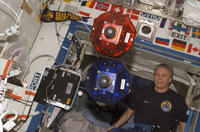-
High school students to compete in DOE National Science Bowl

The U.S. Department of Energy (DOE) created the National Science Bowl in 1991 to encourage students to excel in math and science and pursue careers in related fields. More than 200,000 students have participated in the National Science Bowl in the twenty-three years since its inception. Students from Los Alamos High School will represent New Mexico at the Department of Energy’s National Science Bowl in April.
-
-
Prof. strips, stabs stuffed animal to teach quantum mechanics
Students who showed up for Monday’s quantum physics class of Professor Emlyn Hughes, a Columbia University physics professor, found out they were in for a new approach to teaching the week’s topic.
As the students entered the classroom, they were greeted with the tune of Lil Wayne’s “Drop It Like It’s Hot.” As the students were taking their seats, Hughes removed his clothes, then changed into a black T-shirt and pants. He then sat down and hugged his knees in a fetal position before airing video footage of the 9/11 2001 terror attacks, and videos of aerial bombardments from the Second World War.
-
-
Salt Lake Community College to offer homeland security program
According to statistics from the U.S. Department of Labor, the need for emergency management professionals, protective service workers, and police and sheriff’s patrol officers is likely to increase more than 33 percent between 2011 and 2018. The Utah Board of Regents has approved the first Homeland Security and Emergency Management associate of applied degree in the state at Salt Lake Community College (SLCC).
-
-
2013 Summer Programs for Science Teachers open for applications
The National Institute of Standards and Technology (NIST) is accepting applications for the 2013 NIST Summer Institute for Middle School Science Teachers and the Research Experience for Teachers programs. Both programs offer educators the chance to interact with and learn from top scientists and engineers, in classroom and laboratory settings. The application deadline is 20 March 2013.
-
-
NIST seeking partners for graduate fellowship programs in science, engineering, math
The National Institute of Standards and Technology (NIST) is seeking one or more qualified institutions or organizations to work with it in developing and implementing a fellowship program to afford doctoral-level graduate students opportunities to work at NIST laboratories on research topics in science, technology, engineering, and mathematics.
-
-
Police experience enlivens classroom teaching
Dennis Marsili spent twenty-seven years as a police officer in the Pittsburgh area, and has attained a vast amount of knowledge which he is now passing on to people who want to work in law enforcement in the future.
-
-
Fourth annual student robotic challenge held today

NASA is joining the Defense Advanced Research Projects Agency (DARPA), the Massachusetts Institute of Technology (MIT), and high school student teams from the United States and abroad for the fourth annual Zero Robotics SPHERES Challenge today, 11 January
-
-
Students overlooking more effective methods
Some of the most popular study strategies — such as highlighting and even rereading – do not show much promise for improving student learning, according to a new report; while the ten learning techniques examined vary widely in effectiveness, two strategies — practice testing and distributed practice — made the grade, receiving the highest overall utility rating
-
-
Free STEM search engine is now mobile
Gooru — a free search engine for learning that brings together science, technology, engineering, and mathematics (STEM) educational materials on the Web — developed the Gooru Collections iPad app to bring thousands of assorted multimedia resources to teachers and students on the go
-
-
Neuroscience study reveals new link between basic math skills and PSAT math success
New research provides brain imaging evidence that students well-versed in very basic single digit arithmetic (5+2=7 or 7-3=4) are better equipped to score higher on the Preliminary Scholastic Aptitude Test (PSAT), an examination sat by millions of students in the United States each year in preparation for college admission tests
-
-
New approach to science education: bite-size YouTube mini-lessons
A university of Michigan professor created a cheeky, perhaps even quirky, series of mini-lessons posted on YouTube; the series takes interesting facts about risk science — defined as the science of existing and emerging human health risks — and presents them in small, relatable, and easily digestible video segments to help answer the question, “Just how risky is this?”
-
-
Classroom of the future: next generation of school desks boost math skills
Researchers designing and testing the classroom of the future have found that multi-touch, multi-user desks can boost skills in mathematics; new results from a 3-year project working with over 400 pupils, mostly 8-10 year olds, show that collaborative learning increases both fluency and flexibility in math; it also shows that using an interactive ‘smart’ desk can have benefits over doing mathematics on paper
-
-
Exemplary engineering programs at U.S. colleges and universities
Dr. Charles M. Vest, president of the National Academy of Engineering, says that “This nation’s prosperity, security, and quality of life are direct results of leadership in the engineering achievements that drive society forward”; the National Academy of Engineering (NAE) has released Infusing Real World Experiences into Engineering Education, which showcases twenty-nine engineering programs at colleges and universities across the United States which effectively incorporate such activities into their curriculum; the report also highlights best practices for schools seeking to create new programs
-
-
Scholarship program invites students to share their enthusiasm for math
Raytheon Company is calling for submissions to its 2012-13 MathMovesU Middle School Grant and Scholarship Program. To participate, sixth-, seventh-, and eighth-grade students nationwide are invited to illustrate the importance of math in the mission to Mars and in space exploration
-
-
Study supports move toward common U.S. math standards
A new study analyzing the previous math standards of each state provides strong support for adoption of common standards, which U.S. students desperately need to keep pace with their counterparts around the globe
-
- All
- Regional
- Water
- Biometrics
- Borders/Immig
- Business
- Cybersecurity
- Detection
- Disasters
- Government
- Infrastructure
- International
- Public health
- Public Safety
- Communication interoperabillity
- Emergency services
- Emergency medical services
- Fire
- First response
- IEDs
- Law Enforcement
- Law Enforcement Technology
- Military technology
- Nonlethal weapons
- Nuclear weapons
- Personal protection equipment
- Police
- Notification /alert systems
- Situational awareness
- Weapons systems
- Sci-Tech
- Sector Reports
- Surveillance
- Transportation
Advertising & Marketing: advertise@newswirepubs.com
Editorial: editor@newswirepubs.com
General: info@newswirepubs.com
2010-2011 © News Wire Publications, LLC News Wire Publications, LLC
220 Old Country Road | Suite 200 | Mineola | New York | 11501
Permissions and Policies
Editorial: editor@newswirepubs.com
General: info@newswirepubs.com
2010-2011 © News Wire Publications, LLC News Wire Publications, LLC
220 Old Country Road | Suite 200 | Mineola | New York | 11501
Permissions and Policies
